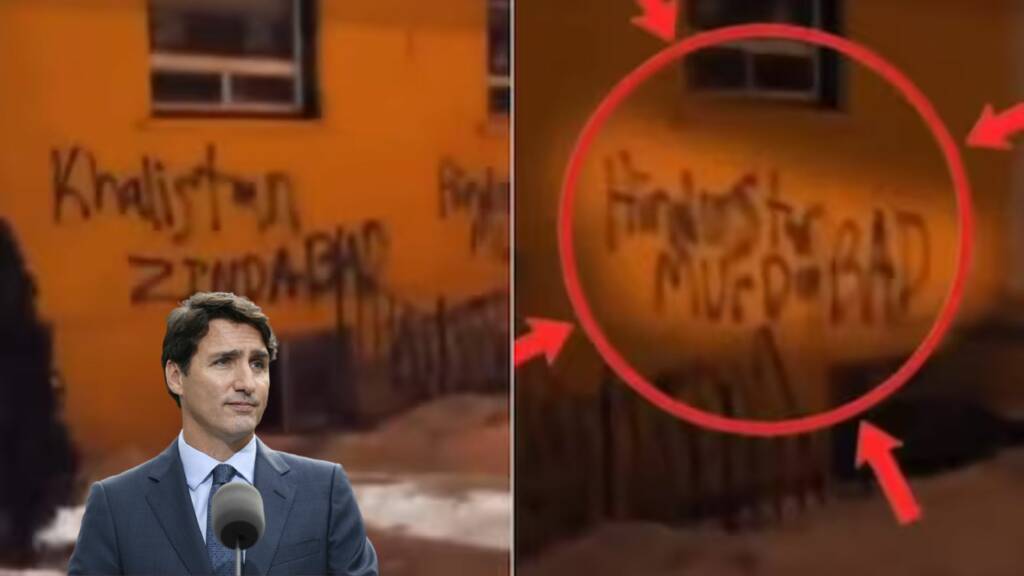The Trudeau government in Canada is renowned for catering to Khalistani elements in order to maintain its support base of pro-Khalistani Sikh Canadians. Trudeau has repeatedly expressed support for causes advocated by Khalistani elements. Khalistan, the issue that froze India-Canada ties for three decades beginning in 1980, has resurfaced as a concern more recently, putting a huge dent in Indo-Canada bilateral relations.
According to recent reports, the Indian Embassy in Canada has conveyed its serious concerns over the defacing of a Hindu Gauri Shankar temple in Brampton, Greater Toronto, by suspected so-called Sikh separatists to Global Affairs, Canada and has separately asked the local law enforcement agencies to act against the perpetrators. The Indian concerns were conveyed in the form of note verbale to the Justin Trudeau government today in Canada.
The seeds of current tensions were sown when Mr. Trudeau took office in 2015. He gained widespread backing from some of the most extremist Khalistani political organisations, and he has consistently failed to consider the sensitivities in India where Sikh terror groups have received assistance from individuals in Canada in the past.
A major breaking point came when Mr. Trudeau attended a “khalsa day” parade organised by one of the more radical gurdwaras in Toronto. At the time, the Ministry of External Affairs (MEA) made it clear that India’s protest had been taken up with the Canadian government.
Although Sikhs constitute about 1% population in Canada, they wield political influence in several key constituencies. With the growing support for the Khalistan movement in the country, Justin Trudeau and his party have often encouraged the radical Sikh extremists vowing to secede Punjab from the Indian territory. His party had been harbouring prominent Khalistan supporters, including the former Minister of Innovation, Science, and Industry Navdeep Bains.
The Khalistani influence in Trudeau’s government is so strong that the Ontario Assembly, dominated by Trudeau’s Liberal Party, passed a resolution last year condemning the “genocide” of Sikhs in India in 1984. Also last year, Canada’s High Commissioner to India had to apologise after India reacted sharply when a former CRPF officer was initially denied entry at Vancouver airport on the grounds that he had served a government that engaged in “terrorism, systematic or gross human rights violations, or genocide”.
Also Read: Khalistanis have hijacked British Columbia, with Trudeau’s silent approval
Issues over the growth of Sikh extremist groups, especially those seeking a “referendum 2020” for the worldwide Sikh diaspora to vote on an “independent khalistan” have been raised several times in the past few years.
To be clear, India has never asked the Trudeau administration not to connect with the Sikh population that constitutes their electorate, but the question is why it is necessary to pander to radical khalistani forces.
Furthermore, the Liberal Party’s support for the Khalistan cause has grown following the election of Canadian MP and Khalistan supporter Jagmeet Singh to national politics. Singh’s party is in coalition with Trudeau’s minority government, which has caused Trudeau to succumb to Khalistani pressures out of fear of losing power. In other words, Trudeau must follow Jagmeet’s lead, no matter how strong his demands are. Singh is, in reality, the driving force behind the emergence of Khalistani sentiments within the Sikh community, both within and externally.
It is unfortunate that a country with the reputation of being one of the world’s greatest democracies is now openly advocating secession in other countries. To be sure, the Indian government under PM Modi will not remain silent and allow Trudeau to continue to endanger Indian national interests. Trudeau may prioritise his own interests over the needs of his country, but leaders like Modi are once-in-a-generation products who will go to any length to protect their country’s interests.
https://www.youtube.com/watch?v=ECKnV9FPD_4
